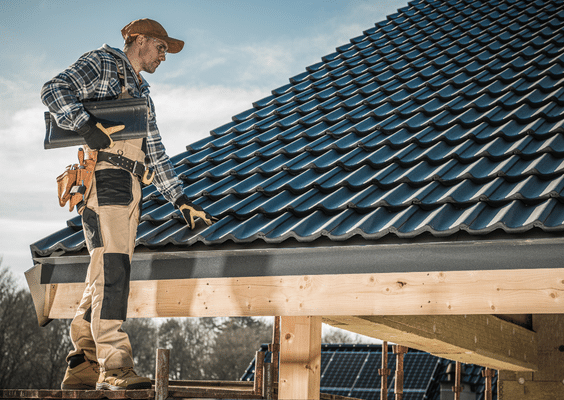The services of a house inspector should not be overlooked. Their duty is to conduct a thorough inspection of the property and report any issues they find to you before you commit to buying the house. This will provide you piece of mind and shield you from unexpectedly high repair costs caused by a problem you missed.
Home Inspection is a potential career option for people who love hands-on work, have an eye for detail, and have strong communication skills, all of which are highly valued by employers as returning veterans want to find a new employment that matches their talents and interests.
What Is A Home Inspector?
A home inspector is a qualified expert who is hired to examine a dwelling and its associated structures. They investigate the home from top to bottom, inside and out, and provide you with a detailed report of their findings. The inspector’s findings, no matter how great or minor, will be detailed in this report. A competent and experienced inspector will be able to point out flaws, offer solutions, and give their expert judgement.
Since a home inspection is likely to be paid for by the buyer, it is in your best interest to choose the most qualified professional available. Ask your real estate agent for referrals to qualified inspectors. Find someone you trust to check your home thoroughly by asking around or doing some online research.
What Do Home Inspectors Do?
A home inspector will perform a comprehensive visual inspection of your property, looking for any signs of damage. They will look into and evaluate the following:
Basements and attics, which are rarely utilised, are prime locations for hidden dangers. It is important to routinely inspect the basement for symptoms of water damage, foundation fractures, or leaks. It is important to check the attic to make sure the ducts and other structural components are in excellent shape.
There are a plethora of wires and cables to check in every electrical system. It is the inspector’s responsibility to verify the integrity and proper functioning of every wiring. They must also keep an eye out for any suspicious wiring that might create problems later on.
The plumbing system is another important part of a property that should be thoroughly inspected. They need to keep an eye out for signs of damage to the water heater or other plumbing issues. It’s crucial that the plumbing be in good shape since water is constantly being pumped through the house to the kitchen and each bathroom.
Even while there may be less things to check in a bedroom than in other areas, it’s still important to do so. All doors and windows must function properly before an inspection is considered complete. They will also be on the lookout for cracked or stained walls and ceilings that can indicate a more serious problem.
Bathrooms include some of the most vital plumbing in the house, therefore it’s crucial that the inspector give careful attention to each one. The plumbing fixtures, including the sinks, toilets, and showers, should be tested to ensure good operation and drainage. Water damage and leakage in the plumbing system will also be major concerns for the inspectors.
The home inspector’s primary concern in the kitchen is the proper operation of all equipment. This entails putting various kitchen and bathroom fixtures through their paces. They will also check for leaks or other indicators of damage, such as cracks or discoloured areas that might indicate water damage.
Any property owner will tell you that an operational HVAC system is crucial year-round. On any given day, you’ll want either heating or cooling, therefore it’s vital that the HVAC system be tested for any signs of trouble. The HVAC installation should be neat and free of any odours or cracks for the inspector to provide a positive report.
The majority of the home inspector’s time will be spent inside the house, but the inspector will also spend time checking over the outside (garages, sheds, gutters, etc.). This entails looking around the foundation of the house for anything out of the ordinary. Cracks, damage, and decaying timber, if present, will also be evaluated by the inspectors.
What is the salary of a roofing contractor?
A roofing contractor’s income may change based on their years in the industry, where they choose to work, the complexity of their projects, and other factors. The BLS reports that roofing contractors in the United States earn a median yearly salary of $43,690. However, skilled roofers with years of experience and specialised knowledge can make much more.
Roofing contractors can make money above and beyond their regular pay by completing jobs on time and within the agreed upon budget and receiving bonuses or commissions. There is a possibility that some roofers are also company owners, and that this is how they supplement their income.
Can you become a roofing contractor without a licence?
The answer is yes; roofing contractors in the state of Florida must have a valid licence in order to do roofing work.
Roofing companies in Florida can apply for one of many different licences, each of which is specific to a certain sort of roofing work. Here is a rundown of the many roofing certifications available:
Licensed Roofer:
This licence restricts a contractor’s scope of operation to a single municipality or county. The degree and experience requirements are low because it is designed for smaller tasks.
Professionally Trained Roofers
A higher level of training and experience is necessary to qualify for this licence, which grants statewide validity in Florida.
General Contractor:
Although it grants greater flexibility than other roofing licences, a general contractor’s permit is only granted when substantial training and experience have been accumulated.
Roofing contractors in Florida must satisfy several criteria before being issued a license. These include demonstrating competence via examination and documentation of insurance and financial stability. The specific criteria are different for each kind of licence.
Roofing work in Florida that has not been licensed is unlawful and punishable by law. You run the risk of receiving subpar service or falling victim to a fraud if you choose a roofer who is not properly licenced.
How to Get Started in the Roofing Industry
How to Become a Roofing Contractor Here Is a Step-by-Step Guide
First, get a GED or high school diploma:
A high school diploma or its equivalent is the first stepping stone towards a career as a roofing contractor. This is the very minimum needed to enter into a programme of higher learning.
Second, get some experience in the field:
Roofing companies look for candidates with a minimum of three years’ expertise in the field. This knowledge can be acquired through an apprenticeship in roofing or by work as a roofer in a larger construction company.
Third, enrol in a technical institute:
You may get the education and training you need to succeed as a roofing contractor by enrolling in a vocational school. Roofing materials, installation methods, safety protocols, and company management are just some of the subjects covered in these programmes, which can run anything from a few months to two years.
Get Your Licence:
Roofing companies in certain states must meet licencing requirements before opening for business. While specifics vary by state, most require applicants to provide proof that they have met educational and job experience benchmarks in addition to passing a licencing exam.
Obtain certifications:
Roofing companies may show their knowledge and trustworthiness to new clients by earning one of several available certifications. The Certified Roofing Contractor (CRC) and the Certified Roofing Professional (CRP) are two examples of these credentials.
Learn new things and keep up with the latest trends:
The roofing sector is no exception to the rule of perpetual change and development. Roofing companies should always be looking into the newest roofing materials, methods, and safety practises. This may be accomplished by activities such as enrolling in online classes, reading relevant periodicals, and visiting conventions.
Ask for assistance :
The Florida Department of Veterans Affairs may be able to help you get your roofing contractor’s licence if you are a veteran living in Florida. Veterans may get support with things like getting their enterprises licenced and certified, among other things, through this organisation.
To sum up, becoming a roofing contractor requires a high school diploma or equivalent, relevant work experience, vocational school, a licence, certifications, and ongoing education and training in the latest industry trends and practises.
Steps to apply for educational benefits
Those with a love of the outdoors and an interest in building might find satisfying work as roofing contractors. Using your Veterans Affairs (VA) education funds to become a roofer is a multi-stage procedure. Here is a detailed tutorial:
Finding out if you qualify for VA education benefits is the first step in using them to become a roofing contractor. There are a number of variables that determine eligibility, including the length and kind of military service, as well as the chosen field of study. Visit the VA website or get in touch with a VA official to find out whether you qualify.
After you’ve established that you meet the prerequisites, you can start looking for a training programme that will provide you with the expertise you need to launch a career as a roofing contractor. There are several educational opportunities available to you, such as universities, colleges, and trade schools.
The next step after settling on a course of study is filling out an application for entry. Completing an application, sending transcripts and test results, and paying an application fee are commonly required steps in this procedure; however, this might vary per school.
You can apply for VA education benefits if you’ve been accepted to a school. To apply, you must fill out an application, submit proof of military service, and choose an academic programme.
You can start your selected education programme once you have been accepted for VA education benefits. If you want to be a successful roofing contractor, this is the training you need.
The roofing contractor licencing standards vary from one state to the next. As part of the licencing procedure, applicants must submit an application and undergo electronic fingerprinting through a state-approved service, such the Florida Department of Law Enforcement (FDLE). Completion of a state-approved academic programme, successful completion of a state-mandated examination, and satisfaction of any additional state-mandated criteria are usual minimums.
Roofing experience is crucial to being a successful roofing contractor, while finishing an education programme and receiving a licence. You may get your feet wet in the roofing industry by serving as an apprentice or trainee for an established professional.
You may start your own roofing contractor firm if you have the necessary expertise and licencing. In order to do this, you will need to register your firm, buy any essential materials and tools, and advertise your offerings to the public.
Finding out if you’re qualified to use VA education benefits to become a roofing contractor, selecting a programme, applying for admission and VA benefits, enrolling in the programme, getting licenced, gaining experience, and opening your own business are all necessary steps. A lucrative career as a roofing contractor is within reach for anybody willing to put in the time and effort.
Conclusion
When it comes to protecting the people inside of structures, nobody is more important than the roofing contractors who work on them. They work on both commercial and residential roofs, installing, repairing, and maintaining them.
As part of the licencing process, veterans are required to undergo a background check, which includes electronic fingerprinting through a state-approved agency like FDLE. Even if a roofing contractor doesn’t need a licence in your state, you should still make sure they have the right education and expertise to do the job.
The steps to becoming a Home Inspector are detailed in this article to inspire interested veterans to take the plunge into a new and interesting professional field.




